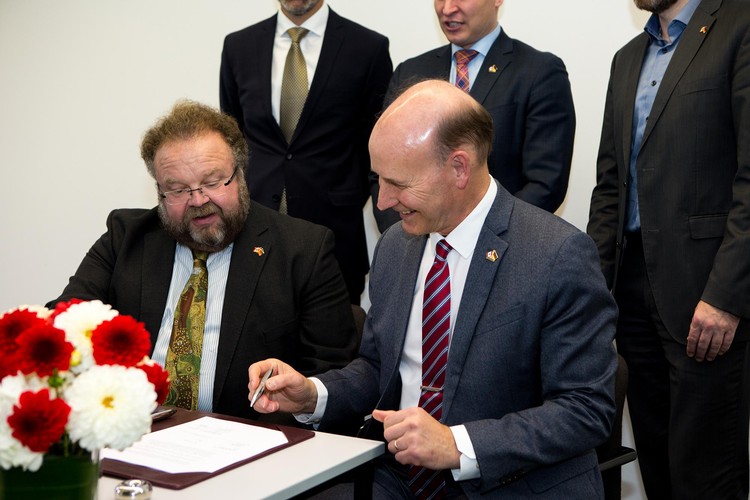International research partnership brings new bio-energy technology to Alberta
Kenneth Tam - 25 October 2017

Fraunhofer's Professor Andreas Hornung and University fo Alberta Interim Vice-President (Research) Walter Dixon signing the research partnership agreement. Image © Fraunhofer-Gesellschaft
Yesterday the University of Alberta signed a research collaboration agreement with Germany’s €2.1 billion, 69-institute Fraunhofer Society to launch a new Technology Platform partnership. The Platform will support joint projects that develop new energy technologies and test them with Alberta feedstock material. Bio fuels, storage batteries, and alternative uses for CO2 will be some of the first topics, with one project already underway.
The Fraunhofer Society specializes in technologies for real-world applications, and through the $75 million Future Energy Systems research initiative, University of Alberta researchers will have the chance to put cutting-edge equipment to the test.
“These are new technologies that can directly benefit Alberta communities, and need to be assessed in the real-world,” explains Dr. Amit Kumar, deputy director with Future Energy Systems and principal investigator on the joint Biobattery project. “Our expertise in life-cycle assessments and the unique testing opportunities with Alberta feedstock make us natural partners with Fraunhofer.”
Energy from waste
The Technology Platform’s first joint project is Biobattery, which will bring thermo-catalytic reforming (TCR®) technology developed by Fraunhofer’s Dr. Andreas Hornung to Edmonton. The TCR® is a shipping-container sized pilot plant that can process a variety of wastes into three valuable products –– bio-oil, char, and gases –– at a rate of 30kg/hour.
Hornung describes the flexibility: “Depending on the situation, the TCR® unit could power itself with one of those products, while we utilize the others. With the correct feed stock, it could even produce viable jet fuel.”
The Biobattery project will test a variety of Alberta feed stocks such as municipal, agricultural, and forestry waste. The Government of Alberta’s ministry of Economic Development of Trade, Alberta Innovates, Susteen Technologies Canada and WestJet have joined Future Energy Systems and the University of Alberta as partners on the project.
Fraunhofer has begun testing this technology in Birmingham, UK, but in Alberta the TCR® could allow decentralized communities to turn local waste products into energy. However, the technology’s practicality would vary across the province.
“The business case for a TCR® unit is highly dependent on what waste products are readily available in a given area,” Kumar says. “Our research will assess Alberta waste products to see which ones produce viable fuels, so we can understand what characteristics a community would need for this technology to make economic and environmental sense.”
The TCR® test unit is expected to arrive in Edmonton in 2018.
More technologies in the near future
Plans are developing for another project bringing Fraunhofer-developed Vanadium Redox-Flow battery technology to Alberta for testing. Redox-Flow batteries are intended to support renewable power installations, allowing intermittent energy from sources like solar and wind to be temporarily held for later use. Future Energy Systems researcher Ryan Li may lead a project that integrates this technology into an Alberta grid, and assesses its effectiveness and cost.
“We are pleased that we have found an excellent partner with the University of Alberta to further advance our research activities internationally. We have been exchanging knowledge and ideas for several years, and through the signing of the contract, we can further expand our strategic partnership with Canada,” says Hornung.
“This agreement establishes a platform upon which many future energy technologies can be developed for use in Canada, Germany, and around the world,” Kumar concludes. “We look forward to many partner projects with Fraunhofer in the years ahead.”
The platform agreement was signed in Munich, Germany, on behalf of the University of Alberta by Interim Vice-President (Research) Walter Dixon, who traveled with an Alberta delegation led by Economic Diversification and Trade Minister Deron Bilous.